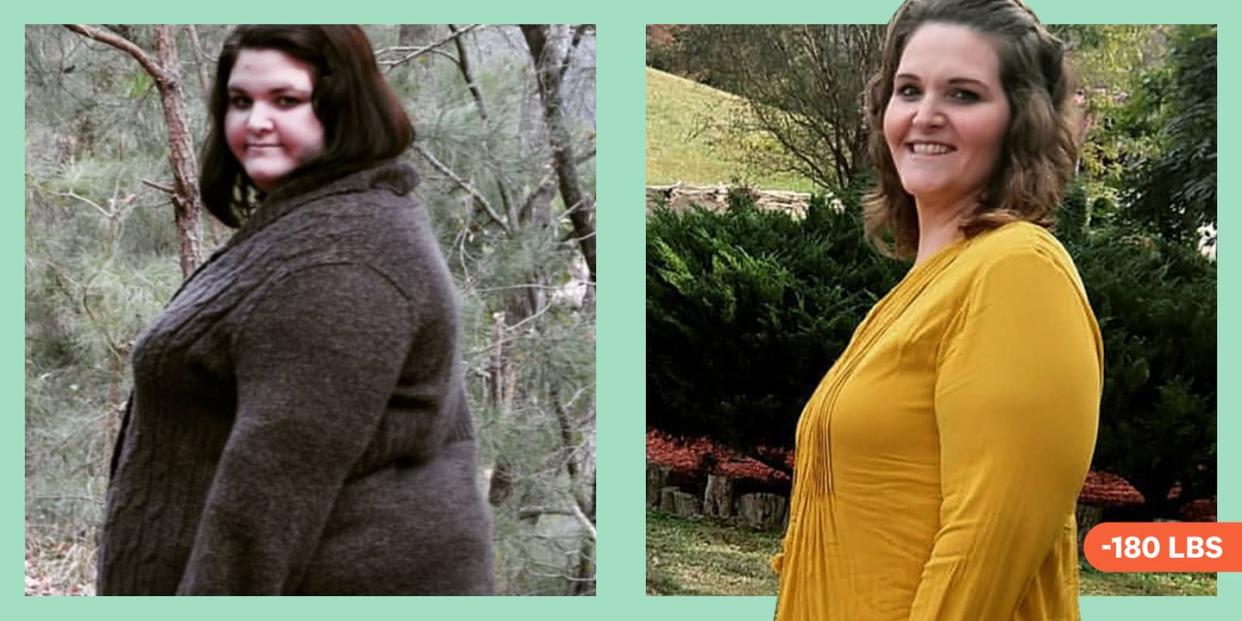'After Bariatric Surgery, I Stick To Keto And A Sugar-Free Diet And Have Kept Off Over 180 Pounds'

I’m Leah Carlson (@watchmewaistingaway), 31. I live in Asheville, North Carolina, and I’m a customer experience coordinator. In 2014, I got a vertical sleeve gastrectomy to kick off my weight-loss journey and have kept over 180 pounds off since.
I remember being drawn to food even at a young age. At family get-togethers, all the other kids would go outside to play, and I'd sit near the food and listen to the adults talk. By the time I was 9 years old, I was sneaking and eating peanut butter in the middle of the night—and I was overweight. I continued developing this unhealthy relationship with food all through my school years.
In February of 2011, my first marriage ended. I was a 411-pound single mom with no job, no money, and no hope. But one night, I was at a friend’s wedding and happened to sit next to someone who was very passionate about fitness and health. He told me something that still sticks with me today: "If you want to change, stop blaming others."
That was really hard to hear, but a lightbulb went off for me in that moment. I had been blaming others for years. I decided to take responsibility and commit to change.
It was up to me to admit my weaknesses—and up to me to ask for support.
Change didn't happen immediately, though. I met my now-husband through friends of friends, and we got married in 2014 and knew we wanted to have a baby. But I was obese by the time I had my first child, and morbidly obese after my second child.
At my highest weight of 411 pounds, I realized I could not be left alone with my two young toddlers. I was unable to pick them up or chase after them in public. It was a safety issue at that point. I was really interested in weight-loss surgery and had done a lot of research on bariatric surgery. I knew that losing weight would be hard work, but I needed help.
So I had weight-loss surgery later in 2014, and I got pregnant with my third child less than a year out.
Around this time, I also discovered the keto diet. When I was in high school, I got familiar with the Atkins diet, so I had been following a low-carb way of eating off and on for so many years. Going on the keto diet made sense for me. I was also eating keto for four months before my surgery.
What I love about keto—which focuses on eating high-fat and low-carb—is the freedom I have to get creative with cooking. It works well for me because of the accessibility. I know that I can go to a restaurant and find something that fits my needs.
One of the hardest things about trying to lose weight for me was the idea of starting a new diet that would be completely foreign to me. That’s why keto and low-carb, sugar-free eating is still such a good fit for me today. I love cooking and eating (and that is okay!). So I have learned over the years to prepare things I'm craving that fit my way of eating. I don't deprive myself.
I also try to shop the outer edges of the grocery store—meaning the produce, proteins, dairies—while staying away from the processed items in the inner aisles. I love to get creative making sugar-free desserts and low-carb comfort foods.
This is what I typically eat in a day now:
Breakfast: Eggs! They are cheap and easy to make.
Lunch: Low-carb tortillas are great to keep on hand. I make turkey wraps regularly.
Snacks: String cheese is life.
Dinner: My husband makes the best pan-seared ribeye steak. We find them on sale and freeze them for fabulous date nights in. We serve them with roasted veggies. I could eat them every day and not get tired of them.
Dessert: I use Swerve sweetener and make sugar-free cookies and ice cream. When it comes to dessert, I love to get creative (and always share on Instagram to help support others).
When it comes to exercise, I never fit into the gym scene. Instead, I set simple activity goals for myself that can be achieved anywhere.
For instance, I'll give myself the general goal of making sure I spend at least 30 minutes of my day doing something active. This can be anything from playing with my kids outside, working in the garden or with the chickens, or even cleaning. Just moving.
Weight-loss surgery is not the easy or cowardly way out. It was the hardest thing I've ever had to do.
Weight-loss surgery may be a helpful too for some people. But I had to work hard to lose weight after my surgery. And I still struggle with the mental challenges of food addiction every day.
Throughout this journey, I’ve realized the biggest part of losing weight isn't physical. It is emotional, mental, and even spiritual changes that you go through, too. Taking responsibility is surprisingly freeing.
Ask for and accept support and accountability help. We aren't meant to do this alone. It can feel intimidating at first, but you will be surprised at the willingness of others to help you on your journey.
You Might Also Like